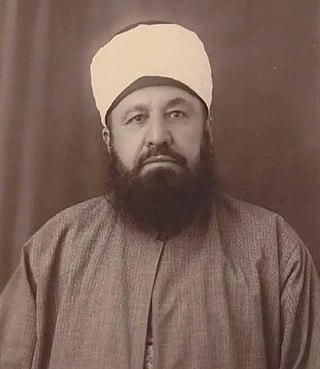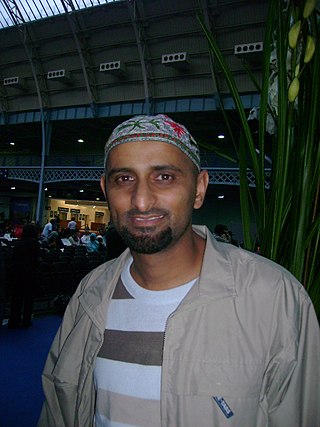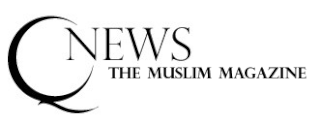Islamism refers to a broad set of religious and political ideological movements that believe Islam should influence political systems, and generally oppose secularism. The advocates of Islamism, also known as "al-Islamiyyun", are dedicated to realizing their ideological interpretation of Islam within the context of the state or society. The majority of them are affiliated with Islamic institutions or social mobilization movements, often designated as "al-harakat al-Islamiyyah." Islamists emphasize the implementation of sharia, pan-Islamic political unity, and the creation of Islamic states.

The Society of the Muslim Brothers, better known as the Muslim Brotherhood is a transnational Sunni Islamist organization founded in Egypt by Islamic scholar and schoolteacher Hassan al-Banna in 1928. Al-Banna's teachings spread far beyond Egypt, influencing today various Islamist movements from charitable organizations to political parties.

The history of Saudi Arabia as a nation state began with the emergence of the Al Saud dynasty in central Arabia in 1727 and the subsequent establishment of the Emirate of Diriyah. Pre-Islamic Arabia, the territory that constitutes modern Saudi Arabia, was the site of several ancient cultures and civilizations; the prehistory of Saudi Arabia shows some of the earliest traces of human activity in the world.

The Kingdom of Saudi Arabia is an Islamic absolute monarchy in which Sunni Islam is the official state religion based on firm Sharia law. Non-Muslims must practice their religion in private and are vulnerable to discrimination and arrest. While no law requires all citizens to be Muslim, non-Muslim foreigners attempting to acquire Saudi Arabian nationality must convert to Islam. Children born to Muslim fathers are by law deemed Muslim.

The Salafi movement or Salafism is a revival movement within Sunni Islam, which was formed as a socio-religious movement during the late 19th century and has remained influential in the Islamic world for over a century. The name "Salafiyya" is a self-designation, to call for a return to the traditions of the "pious predecessors", the first three generations of Muslims, who are believed to exemplify the pure form of Islam. In practice, Salafis claim that they rely on the Qur'an, the Sunnah and the Ijma (consensus) of the salaf, giving these writings precedence over what they claim as "later religious interpretations". The Salafi movement aimed to achieve a renewal of Muslim life and had a major influence on many Muslim thinkers and movements across the Islamic world.

Lloyds Bank plc is a major British retail and commercial bank with a significant presence across England and Wales. It has traditionally been regarded one of the "Big Four" clearing banks.

Pan-Islamism is a political movement which advocates the unity of Muslims under one Islamic country or state – often a caliphate – or an international organization with Islamic principles. Historically, after Ottomanism, which aimed at the unity of all Ottoman citizens, Pan-Islamism was promoted in the Ottoman Empire during the last quarter of the 19th century by Sultan Abdul Hamid II for the purpose of preventing secession movements of the Muslim peoples in the empire.

Adnan Khashoggi was a Saudi businessman and arms dealer known for his business deals and lavish lifestyle. He was estimated to have had a peak net worth of around US$4 billion in the early 1980s.

Muhammad Rashid Rida was an Islamic scholar, reformer, theologian and revivalist. An early Salafist, Rida called for the revival of hadith studies and, as a theoretician of an Islamic state, condemned the rising currents of secularism and nationalism across the Islamic world following the abolition of the Ottoman sultanate. He championed a global pan-Islamist program aimed at re-establishing an Islamic caliphate.
Sarah Joseph OBE was CEO and Editor of the bygone Muslim lifestyle magazine emel and a commentator on British Muslims. She converted to Islam at the age of 16 in 1988 after being brought up as a Catholic.

Zain Bhikha is a South African singer-songwriter, vocalist, and drummer who performs Islamic nasheeds. Associated with other Muslim singers, including Yusuf Islam and Dawud Wharnsby, Bhikha has collaborated on albums and also released several solo albums.
The Global Peace and Unity is a recurring two-day event/festival and conference held at the ExCeL Exhibition Centre in Royal Victoria Dock, London, England and organized by the Islam Channel. It is the largest Muslim, interfaith and multicultural event of its kind in Europe. There have been six conferences since its inception. The first was on 4 December 2005, with others in 2006, 2007, 2008, 2010 and 2013. The 2006 event attracted over 55,000 visitors from five continents. The conference includes an Islamic exhibition, an evening nasheed concert, as well as a series of talks, workshops, seminars and lectures from international speakers over two days.

Lloyds Banking Group plc is a British financial institution formed through the acquisition of HBOS by Lloyds TSB in 2009. It is one of the UK's largest financial services organisations, with 30 million customers and 65,000 employees. Lloyds Bank was founded in 1765 but the wider Group's heritage extends over 320 years, dating back to the founding of the Bank of Scotland by the Parliament of Scotland in 1695.

Shelina Zahra Janmohamed is a British writer. She is the author of Love in a Headscarf (2009), a memoir of growing up as a British Muslim woman. Her new book titled Generation M: Young Muslims Changing the World was published in August 2016. Generation M, as The Guardian puts it, "is the first detailed portrait" of the influential segment of the world’s "fastest growing religion", Islam. She is also a blogger: her blog is called Spirit 21.

Maher Zain is a Lebanese-Swedish R&B singer, songwriter and music producer. He released his debut album Thank You Allah, an internationally successful album produced by Awakening Records, in 2009. He released his follow-up album Forgive Me in April 2012 under the same production company, and a third album One in 2016.
Mohamed Nasir Nabil Abdul Rashid bin Suleman Obineche, known as Nabil Abdulrashid, is an English comedian of Nigerian descent. In 2010, at the age of 25, he became the youngest black comedian to perform stand-up at the Hammersmith Apollo.

TSB Bank plc is a British retail and commercial bank based in Edinburgh, Scotland. It has been a subsidiary of Sabadell Group since 2015.

Q-News is a defunct British monthly magazine organised around themes mostly pertinent to Muslims.

Starting in the mid-1970s and 1980s, Salafism and Wahhabism — along with other Sunni interpretations of Islam favored by the Kingdom of Saudi Arabia and other Gulf monarchies — achieved a "preeminent position of strength in the global expression of Islam."















